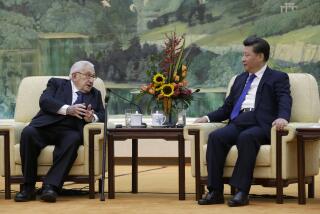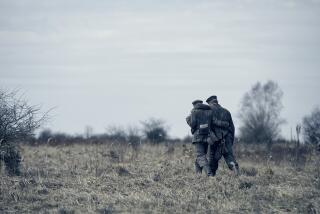Europe’s Media Praise 2 Visits by Reagan, Say Image Changes
- Share via
BONN — Liberal and conservative West German and other European news media joined Monday in praise of President Reagan’s visits to a German war cemetery and a concentration camp, some saying they have dramatically changed his image as a hip-shooting Hollywood cowboy.
Newspaper and radio and television commentators in West Germany were almost unanimous in commending Reagan’s visit to the cemetery at Bitburg where 49 SS troopers are buried among nearly 2,000 other German soldiers killed in World War II. The visit was opposed by American Jewish organizations, some veteran groups and politicians, and it was the most controversial presidential journey since Reagan took office in 1981.
His speeches, at the Bergen-Belsen concentration camp and at the U.S. air base at Bitburg after the brief cemetery visit, were praised for their eloquence and sensitivity.
Still there were some dissenting voices. The Geneva daily La Suisse said of Bitburg: “However short it may have been, this visit is undoubtedly one of the worst blunders in the career of the American president.”
The independent Norwegian daily Dagbladet said in an editorial that the controversy was embarrassing and unnecessary: “For years the relations between Americans and Germans have been so good that it was unnecessary to mark it over war graves.”
‘We Now Are Friends’
The front-page headlines in two of West Germany’s mass circulation newspapers, both of which are read throughout the country, appeared to sum up the main German reaction.
“We Were Enemies, We Now Are Friends,” headlined the Frankfurter Allgemeine Zeitung, quoting Reagan’s speech.
“A Day of Dignity--Reagan and (Chancellor Helmut) Kohl Look to the Future” was the headline in Die Welt.
“When Reagan flew to Madrid Monday afternoon, he left behind in the Federal Republic of (West) Germany the most positive (American) presidential image since the unforgettable Berlin visit of Kennedy in 1961,” the German news service DPA said in a commentary.
“With his Bitburg cemetery visit, Reagan--at considerable domestic cost to himself--performed an act of friendship for the chancellor and gave the Germans a completely new feeling of patriotism,” wrote DPA’s Hans-Juergern Hoefer. “The widely held caricature of the trigger-happy cowboy appeared to vanish overnight.”
The Bonn newspaper General Anzeiger said that Reagan acted with “dignity, honesty and without pathos . . . His steadfastness in the face of heavy criticism was admirable.”
“Ronald Reagan and Helmut Kohl pulled it off,” said the mass circulation Bild Zeitung. “The day of the graves turned into the day of a common future. . . . German-American friendship has won a victory.”
Elsewhere in Europe, the French leftist daily Le Matin said: “President Reagan overcame yesterday, in gravity and dignity, one of the most difficult moments of his presidency.”
‘The Most Difficult Day’
The conservative French newspaper Le Figaro wrote, “The most difficult day of Reagan’s European trip . . . went better than expected.”
The Daily Telegraph, a conservative British daily, said that Reagan “went far to quell the controversy over his visit to the Bitburg war cemetery with two of the most moving speeches he has ever delivered.”
The liberal Guardian headlined its report, “Reagan Balm Washes Bitburg Scars.”
Spanish news media also covered large anti-Reagan demonstrations held the day before the president arrived in Madrid, and many focused on his theme of reconciliation. The Roman Catholic daily Ya headlined its Bitburg story, “Reagan Supports Reconciliation In German Cemetery.”
The Spanish monarchist daily ABC said in its news story that Reagan “overcame with enormous dignity one of the most difficult moments of his presidency during his visit to Bitburg.”
Corriere della Sera of Milan, Italy’s largest newspaper, said: “Overall, Reagan emerged with dignity from an embarrassing situation, considered in America among the most difficult of his presidency. He didn’t evade the problems, but faced them directly, succeeding at times to reach moments of real emotion.”
State television in neutral Austria carried the Bergen-Belsen and Bitburg ceremonies live. The newspaper Kleine Zeitung contended that the furor in America “showed clearly that the SS graves were not the only issue. . . . (Some wanted) to ‘catch’ the up-to-now seemingly invulnerable president making a serious mistake.”
More to Read
Sign up for Essential California
The most important California stories and recommendations in your inbox every morning.
You may occasionally receive promotional content from the Los Angeles Times.













